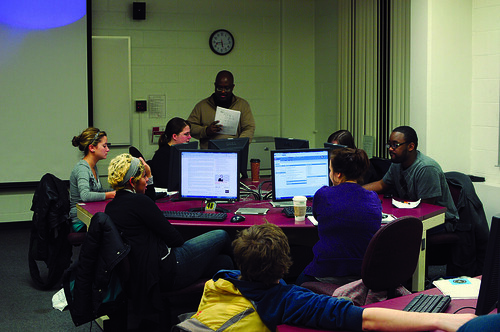Evening classes offered at Temple, after decreasing in 2009, have increased over the last year.

Temple has historically offered its students the opportunity to take evening courses since its founding as a night school in 1884. And between side jobs, a social life and down time, students are now being offered more evening classes to help the night owls balance their schedules more efficiently.
Over the past five years, the total number of night classes has increased gradually, from 1,125 in 2006 to more than 1,175 classes in 2010 for Main, Center City and Ambler campuses combined.
Associate Vice President for Budget and Space Management Bill Wilkinson said in an e-mail the recent openings of Alter Hall, the Tyler School of Art building and the Learning Center at Ambler have “played a role” in increasing the number of night classes offered.
“Enrollment has been improving and the schools and colleges have done a terrific job of utilizing these more modern spaces for the benefit of faculty and students,” Wilkinson added.
The availability of night classes depend on a student’s discipline and degree level, although many professional programs at Temple require students to take night courses, said Diane Maleson, the senior vice provost for faculty development and faculty affairs.
“Students who take night classes are looking to advance in their career,” Maleson, also a professor of law, said. “It gives them the legal perspective that they need.”
Russell Conwell, Temple’s founder, once described the university as “a college where ambitious young people attended classes at night to further their educations and their careers,” when endorsing the Owl as Temple’s official mascot, according to “Temple University: 125 Years of Service, to Philadelphia, the Nation and the World.”
Today, some professors find students take their night classes for a number of reasons, one being the scheduling flexibility they can offer.
“Some [students] like to get a week’s worth of material at one sitting, others work part-time or full-time jobs during the day,” David Hill, an assistant professor of chemistry, said in an e-mail.
Hill said last year the department surveyed students in evening sections of an organic chemistry course and found students favored the opportunity to attend a weekly lecture by a ratio of 2-to-1 compared to having two or more daytime lectures per week.
“I find that students who take night courses tend to be more motivated and involved in their careers,” Maleson said. “There’s camaraderie within it that they’re in this together.”
Students and teachers have stated the relatively long duration of classes after 4:30 p.m. can affect a student’s interest in the course material.
Junior marketing major Ali Simpson said the sole night class she has taken met weekly from 5 p.m. to 8:30 p.m., ending later than she would have liked.
“I was working at the time so it didn’t fit into my schedule,” Simpson said. “I guess the only thing I didn’t like was that it really got out late.”
Adjunct instructor of architecture David Hincher said he tries to break up his night classes with a short break midway through to give students some rest.
“I think students are a little tired at that point in the day,” Hincher added. “Some of them may not have their full attention for a solid three-hour block.”
Instructors who teach night courses receive the same compensation rate as daytime instructors, Maleson said.
Several adjunct instructors find TUCC’s location convenient for their own work schedule as well.
Aubrey Hilbert, an adjunct instructors of sociology, said she typically teaches one night class per semester at TUCC because it is near her full-time job.
“Most of my students take the night class because they need general education courses that fit into their schedules,” Hilbert said in e-mail. “I would say that the night courses are pretty steady in their popularity because it is mostly a scheduling preference for those who work.”
Senior elementary education major Brianna O’Neil said she has yet to take a night class even though she works at the 30th Street Station.
“It’s easier for me to get here in the morning because I work at night,” O’Neil said. “My major [mostly offers] morning classes, so I haven’t taken any night classes.”
Temple is looking for more ways to provide services to the students who regularly take night courses, Maleson said.
Debbie Campbell, the assistant dean of the Fox School of Business, said in e-mail the advising office at Fox recently hired a new associate director who will work with part-time and evening students via WebEx, Skype or phone calls.
In addition, Wilkinson said he expects more online course offerings in the future for both graduate and undergraduate students.
“I also think there could be more ‘all-day’ undergraduate offerings to accommodate larger resident populations,” Wilkinson said.
Research has found night classes as well as academic advising and other support services for evening students can help students succeed in college, according to a report last year by Laura Perna, a professor of higher education at the University of Pennsylvania.
“[A night class] is a great opportunity for everyone,” Hakan Ozdener, an assistant professor of biology, said. “I wish we could run universities 24 hours, seven days because everything is here.”
Connor Showalter can be reached at connor.showalter@temple.edu.


I know that the College of Southern Nevada in Las Vegas offers classes at 1AM which is very interesting for people that work swing shift.